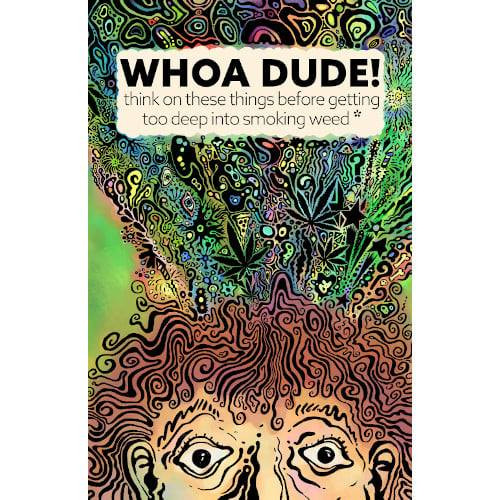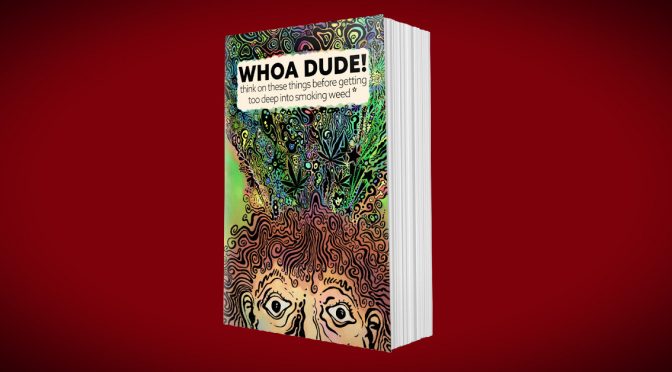Think on these things before getting too deep into smoking Weed* * Or what the science of marijuana is telling us about the harmful effects of marijuana for you, your friends, or your kids.
A book by Kevin G. Becker Ph.D. reviewed by Sally Schindel
It is a long title for a 222 page VERY readable book.
I have read dozens of books about marijuana – the drug and the industry, mental health harms caused by marijuana, substance use disorders and treatment and recovery. Additionally, I’ve read books about the reasons so many feel commercializing and normalizing marijuana is acceptable public policy.
Many of the books left me feeling buried and over my head.
I’m not a scientist or medical professional. I’m a retired accountant/financial advisor and a Mom forever grieving the loss of my son Andy to marijuana-induced suicide.
I am insatiable about learning all I can find about marijuana risks and harms.
Seven plus years ago my son died leaving a note that said, “Marijuana killed my soul + ruined my brain.” I was blindsided. I knew he had serious mental illness problems, but I had NO idea at the time marijuana could have been the cause.
If Andy had read this book
I fully believe had Andy read Kevin Becker’s easy-to-read-and-understand book Whoa Dude! he would have had the knowledge he needed to understand what was happening in his brain. He would have sought the help he needed to treat and recover from his addiction. Had I read this book I would have understood the urgent need to help Andy find the help he needed.
 2021 Book by Kevin G. Becker Ph.D.
2021 Book by Kevin G. Becker Ph.D.
https://whoadude-the-book.com/
The author reminds the reader, the weed user, to be well informed and make wise decisions. He gives facts, no opinions about whether the reader decides to begin or continue using weed.
Though the author opens by stating he’s writing for the weed user, the book is written for everyone – weed users, parents, friends of users and all those just curious about weed. The goals of the book are to burst some myths – that weed never hurt anyone and that there are not a lot of scientific studies on the effects of weed. It is a source book for the enormous amount of scientific study that has been done about the harms. It is a cautionary tale about the dark side of weed and a reminder that, though weed may not harm YOU, it might harm your brother, your friend, your kid, and others.
Understanding the science
Whoa Dude! contains 10 chapters of well-organized, important information. The book helps the reader get their bearings first, understanding what scientific studies are, how to find them, understand them, use them. He provides advice for novice readers of scientific reports. The website whoadude-the-book.com gives the reader complete free access to all the research referenced in the book. He cautions that older studies may not account for the more recent increases in potency and access. He then teaches the reader how to read the scientific literature covering longer time spans to see if a researcher has corrected for confounding variables of potency and of the greater access to weed today.
He provides a list of ten scientific review papers and encourages his readers to choose any, just ONE, as homework. He has read over 10,000 on behalf of the readers and asks that a reader just choose any ONE. Many, many more are included of course in his list of references.
I found the language used in the book to be important. He is addressing a broad audience, not the medical or scientific community. Note the title Whoa Dude! He often refers to marijuana/cannabis as “weed” as young and longer-term users do. He addresses those who “wake and bake”, or smoke weed nearly daily, the chronic users. He discusses the “complex mashup” of behavior, genetics, impulsivity, social cues, family history, and metabolism. So many factors cause different reactions to weed in different people.
Dabbing, Vaping and edibles
Also important is how current the book is in pointing out that users are now more frequently vaping, dabbing, eating edibles or using concentrates like wax or shatter – not just smoking weed.
Especially parents need to know all about this. Younger readers may be drawn into reading this book because the author has made himself familiar with the current state of the industry and social environment, not an old so-called “prohibitionist.”
The illustrations in the book are a highlight in my opinion. They are thought-provoking and memorable, highly unique in a book of this type. I know they would have appealed to my son who appreciated the art in graphic novels. Perhaps they are what will attract a young marijuana user into opening the book and learning some of the science about what drug use does to a brain.
To be shared with everyone
The book is very affordable, only $16.99 for the new paperback or $8.49 Kindle or Nook. Buy Whoa Dude! here.
Author Kevin Baker points out to the reader that if they are going to be a user, they will be spending a lot of money and time with weed. Shouldn’t they know more about it and what it could do to their health?
For me, the end of the book is what grabbed my heart. He tells of his brother Mark and the outcomes of his drug use. I have found it very sad that almost everyone I know who educates about the risks and harms of drug use does it because they have lost, or nearly lost, someone near and dear to them.
Kevin Becker dedicated this book:
“For all the Marks in the world, and for all their families.”
Someday the balance will be tipped, because too many people will be harmed too much by pot and support for this dangerous product will diminish. I believe many of the readers of this book will quit or moderate their use of weed and begin to help tip that balance.
Sally Schindel has written several articles for us, including her testimony, Who said No One Ever Died from Marijuana?”
She wrote a well-received op-ed that was published in USA Today, “There’s nothing funny about today’s highly potent marijuana. It killed my son.”
Editors Note: The author of Whoa Dude! is on a mission to get school libraries to order this book. Parents are encouraged to contact their local school librarians and suggest they make this book available to students in the school library.

